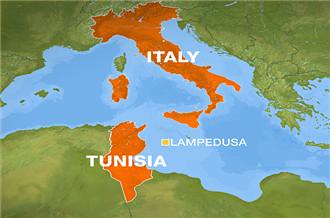
Map showing Italy and Tunisia where many people from that North African state have fled the country to southern Europe in the aftermath of the uprising on Dec. 17, 2010. Ben Ali has resigned but the RCD largely remains in power., a photo by Pan-African News Wire File Photos on Flickr.
Europe struggles with balancing open borders, flood of migrants
By Peter O'Neil, Postmedia News Europe Correspondent
May 4, 2011
The European Union is scrambling to rescue the credibility of one of its greatest achievements - hassle-free travel within a borderless continent - in the face of a new wave of migrants from North Africa.
The EU, under pressure in particular from France and Italy, announced on Wednesday a series of proposals to be considered among leaders of the 27 member- nations at a summit next month.
``The free movement of people across European borders is a major achievement which must not be reversed, but rather strengthened,'' said EU Home Affairs Commissioner Cecilia Malmstrom.
She told journalists, however, it ``may also be necessary to foresee the temporary re-introduction of limited internal border controls under very exceptional circumstances, such as where a part of the external border comes under heavy unexpected pressure.''
The controls would apply to the 25 member-states that signed the Schengen agreement, named after the town in Luxembourg where the original agreement to free up movement of people was struck. Britain and Ireland aren't part of the border pact.
Europe, already under pressure for years from undocumented migration coupled with growing domestic hostility towards newcomers, has been hit with a wave of new arrivals.
The numbers dwarf the 492 undocumented migrants from Sri Lanka who, despite being a fraction of the 22,543 people who filed claims with the Immigration and Refugee Board last year, caused a political firestorm in Canada after arriving last summer in British Columbia.
So far an estimated 25,000, mostly from Tunisia after the ouster of Tunisian president Zine El Abidine Ben Ali, have arrived primarily to the shores of Malta and Italy. An estimated 650,000 people have been displaced in war-torn Libya, the EU noted.
Brussels is coming under pressure from Italy, which is giving permits to North Africans to let them travel elsewhere in Europe. France has responded by trying to block its border and send migrants either back to Italy or to their home countries.
Both French President Nicolas Sarkozy and Italian Prime Minister Silvio Berlusconi, who are collaborating to toughen EU border rules, are under pressure from far-right politicians to crack down on immigration.
Hugo Brady, a migration analyst at the Center for European Reform, said Canada's illegal migration problems pale in comparison to Europe's.
``Europe, unlike North America, is not surrounded by two shining seas and in the case of Canada a relatively calm border with the U.S.,'' he told Postmedia News Wednesday.
``Europe is hooked into the Eurasian land mass, and it's in close proximity to North Africa and the Middle East - some of the world's poorest regions.''
People in those countries are drawn like magnets to one of the world's wealthiest regions, and modern methods of communication mean information moves rapidly on potential migration opportunities, he said.
Brady said he suspects the EU will seek alternative ways to try to contain the inflow of undocumented migrants that don't involve erecting borders that could hurt economic growth.
poneil@postmedia.com
twitter.com/poneilinparis
No comments:
Post a Comment